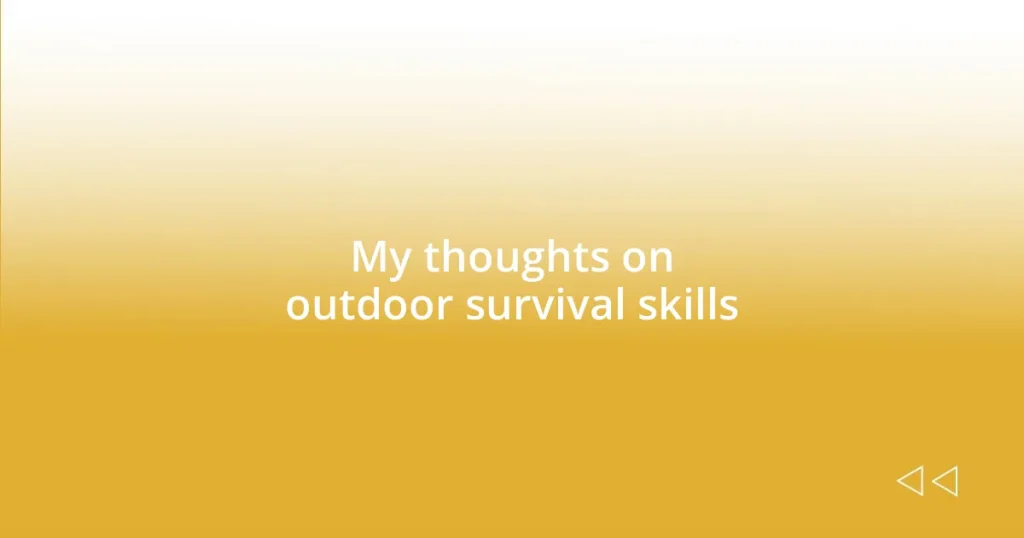Key takeaways:
- Outdoor survival skills are essential for safety and confidence, encompassing both physical techniques and mental resilience.
- Practical skills, like fire building, shelter construction, and foraging, transform uncertainty into confidence and ensure physical safety.
- Important survival tools include a multi-tool for versatility, fire starter for warmth, and a water filter for safe drinking.
- Understanding navigation techniques, including the use of natural landmarks and maps, is crucial for successfully navigating wilderness areas.
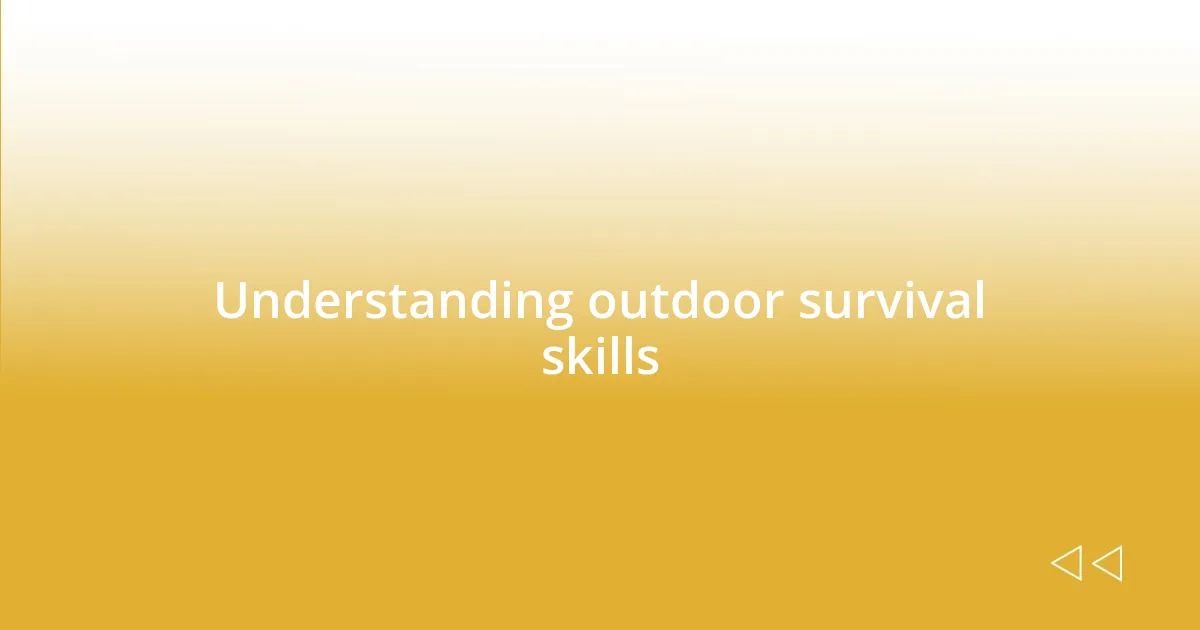
Understanding outdoor survival skills
Understanding outdoor survival skills is like unlocking a treasure chest of knowledge that equips you for challenges in the wild. I remember my first solo camping trip; the thrill of being surrounded by nature was quickly overshadowed by the realization that I didn’t know how to build a fire. That moment of panic taught me just how crucial these skills are—they’re not just useful; they’re essential for safety and confidence in uncertain situations.
It goes beyond merely knowing how to light a fire or purify water. There’s a profound peace that comes with mastering skills like foraging or navigation. One time, while hiking, I encountered a stream and was unsure if it was safe to drink from. My training in identifying natural water sources came in handy. At that moment, I felt a surge of empowerment, realizing I could rely on my knowledge to make informed decisions that could impact my survival.
Have you ever thought about the different mindsets you need when you’re out in the wild? Survival isn’t just about physical skills; it’s also about mental resilience and adaptability. I’ve found that maintaining a calm and clear mindset can make all the difference when facing unexpected challenges, like getting lost or dealing with sudden weather changes. It reminds me that survival skills are as much about mental preparation and attitude as they are about practical techniques.
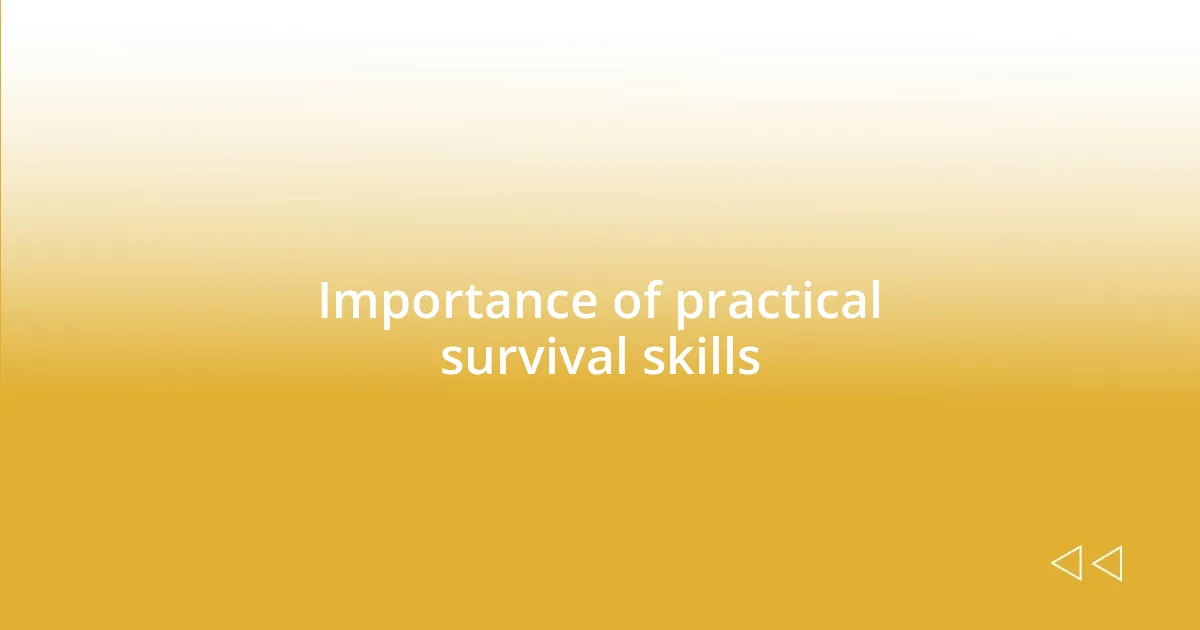
Importance of practical survival skills
Practical survival skills are vital because they transform uncertainty into confidence, both in yourself and your abilities. For me, the first time I learned to construct a shelter using just branches and leaves was a revelation. I remember looking up at the sky, feeling the impending drizzle, and thinking, “I can handle this.” That moment instilled in me an inner assurance—that with the right knowledge, I could adapt to whatever nature threw my way.
The importance of practical survival skills can’t be understated. They not only ensure your physical safety but also bolster your mental strength. Here are a few key aspects:
- Safety First: Skills like first aid can be lifesaving when help is hours away.
- Resourcefulness: Learning to identify edible plants can provide sustenance when food sources are scarce.
- Navigation: Being able to read a map and use a compass prevents disorientation and keeps you on track.
- Problem-Solving: Encountering unexpected situations, like a sudden storm, tests your ability to think on your feet.
- Mindfulness: Practicing survival techniques encourages you to connect deeply with your surroundings, fostering a sense of calm and focus.
Each time I step outside, I carry these lessons with me, appreciating the wisdom they bring to every adventure.
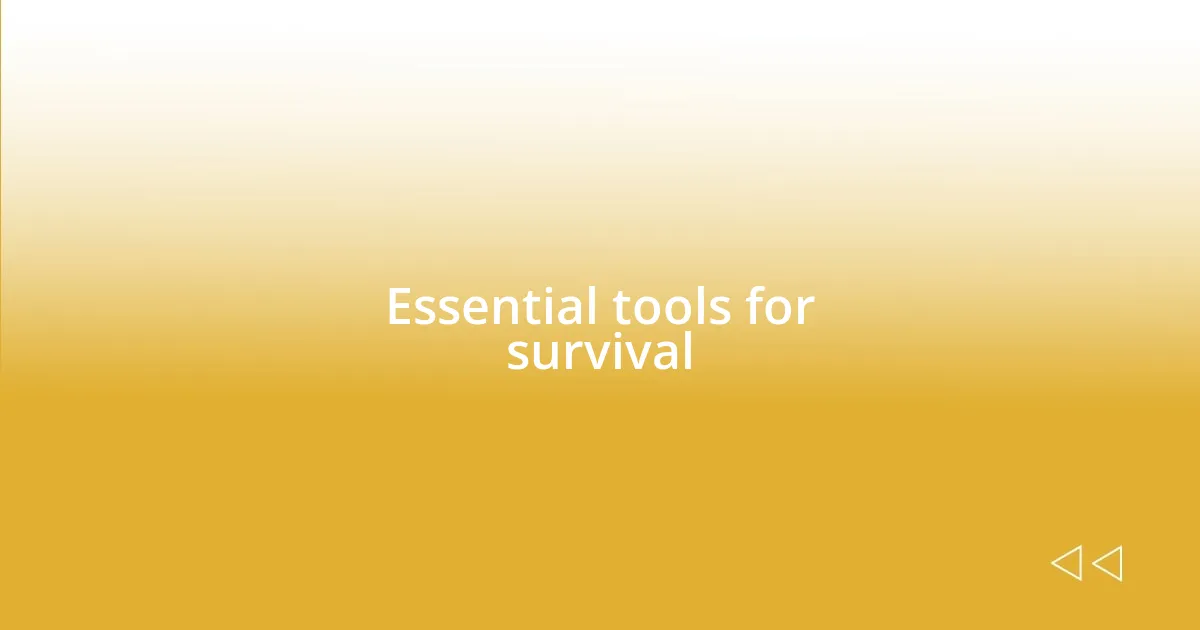
Essential tools for survival
When it comes to outdoor survival, having the right tools at your disposal can significantly enhance your chances of successfully navigating through unexpected situations. I still remember my first backpacking trip when I learned the hard way that a trusty multi-tool is more than just a convenience; it can become your lifeline. In a pinch, I used mine to craft a makeshift fishing hook, which secured my dinner that evening. That experience reinforced how versatile and indispensable such tools are in the wilderness.
Equally vital is a reliable fire-starting tool. I can’t express enough how a simple striker or flint can mean the difference between a warm, safe night and a frigid, uncomfortable one. During one particularly chilly night in the woods, I fumbled with matches and waxed paper, but the moment I picked up my ferro rod, sparks flew, and a cozy fire was roaring in no time. This enhanced my appreciation for fire—not just for warmth but for cooking and signaling for help if needed.
Lastly, a sturdy water filtration system cannot be overlooked. I vividly recall hiking in a remote area, and my canteen was running low. Spotting a stream was a relief, but I was cautious. A compact filter made it easy to drink without worrying about contaminants. That moment taught me the value of preparedness; I felt peace of mind knowing I could easily access safe drinking water even in the wildest settings.
| Tool | Purpose |
|---|---|
| Multi-tool | Versatile functionality for cutting, building, and repair. |
| Fire starter | Critical for warmth and cooking; ensures safety during cold nights. |
| Water filter | Essential for safe drinking water from natural sources. |
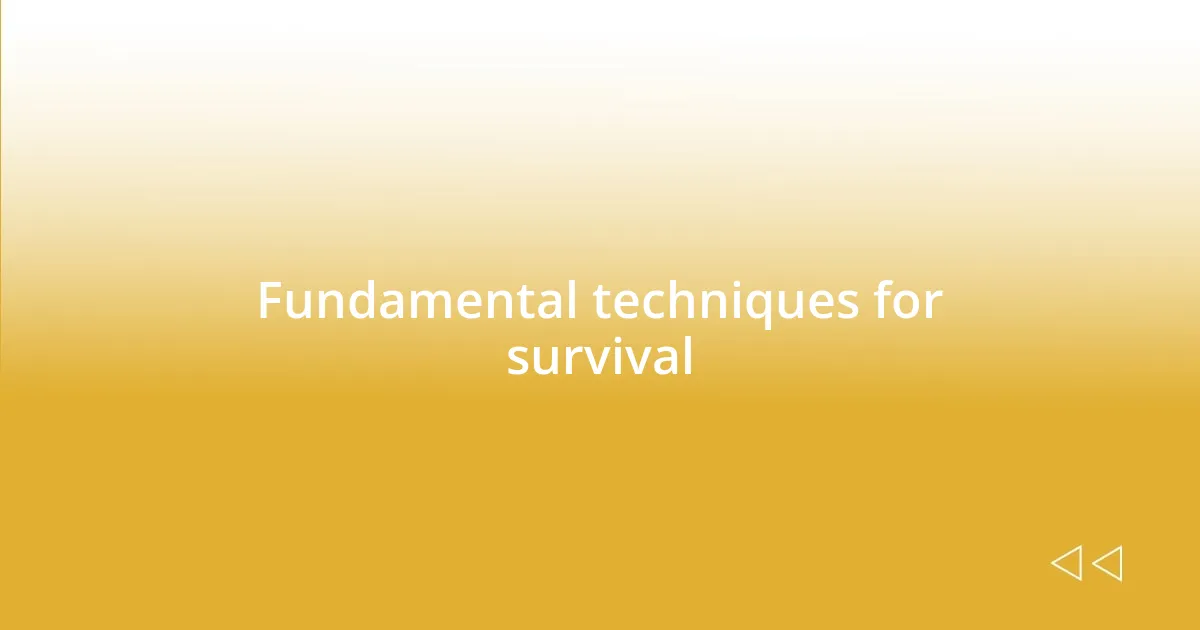
Fundamental techniques for survival
Understanding fundamental survival techniques can truly make or break your experience in the wild. One of the core skills I’ve found invaluable is fire building. I can’t forget the first time I gathered dry twigs and struck flint until I finally created a spark. The warmth of that first flame blossomed into a deep sense of safety, illuminating the dark and providing a vital source for cooking and signaling. Have you ever felt that rush when you conquer a challenge? It’s enlightening!
Another essential technique is creating a shelter. On my first solo camping trip, the weather unexpectedly turned. I remember frantically collecting branches and leaves, feeling the rain begin to fall. After hours of work, my makeshift shelter stood strong against the downpour. It taught me not only about the importance of insulation but also about how resourcefulness can turn a precarious situation into a cozy refuge. Isn’t it incredible how nature pushes us to adapt?
And let’s not overlook the significance of foraging for food. One time, while wandering through a forest, I stumbled upon a patch of wild berries. It felt like discovering hidden treasure! I paused, examined the plants, and recalled what I learned about edible species. That moment was exhilarating; finding that food source reminded me of nature’s ability to provide if we take the time to learn from it. It’s fascinating, isn’t it? Knowing that with the right skills, we can sustain ourselves in the wild!
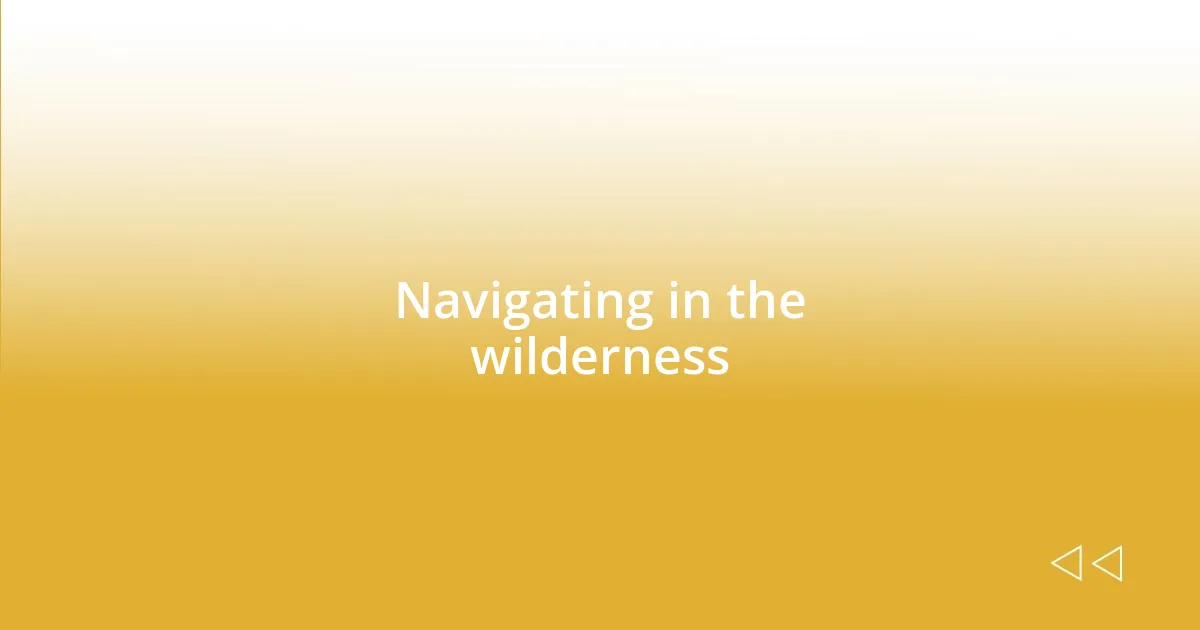
Navigating in the wilderness
When navigating in the wilderness, I’ve found that understanding natural landmarks can be incredibly empowering. On a hiking trip in a foggy forest, I relied on the position of the sun and the unique shape of the trees to maintain my bearings. It was fascinating to witness how subtle signs in nature, like moss growth on tree trunks, can guide you through the thickest of woods. Have you ever considered how much these elements can teach you about the environment around you?
Maps and compasses are indispensable tools if you’re venturing into more remote areas. I once embarked on a multiday trek where my GPS failed me due to low battery. Panic set in for a moment, but I recalled my compass training and used it to read the landscape and find my way. The thrill of pinpointing my location gave me a rush of confidence. Isn’t it remarkable how these traditional skills remain relevant even in our tech-driven world?
I also believe that establishing a good intuition for reading terrain is crucial for navigation. While exploring rugged mountainous areas, I learned to recognize which slopes were gentle and which were steep. During one unforgettable hike, I opted for a steeper route, thinking I’d save time. The challenge was daunting, but reaching the summit was exhilarating. It taught me that every navigation choice comes with its lessons, doesn’t it? Embracing the journey—both the smooth paths and the uphill battles—makes all the difference in the wilderness.
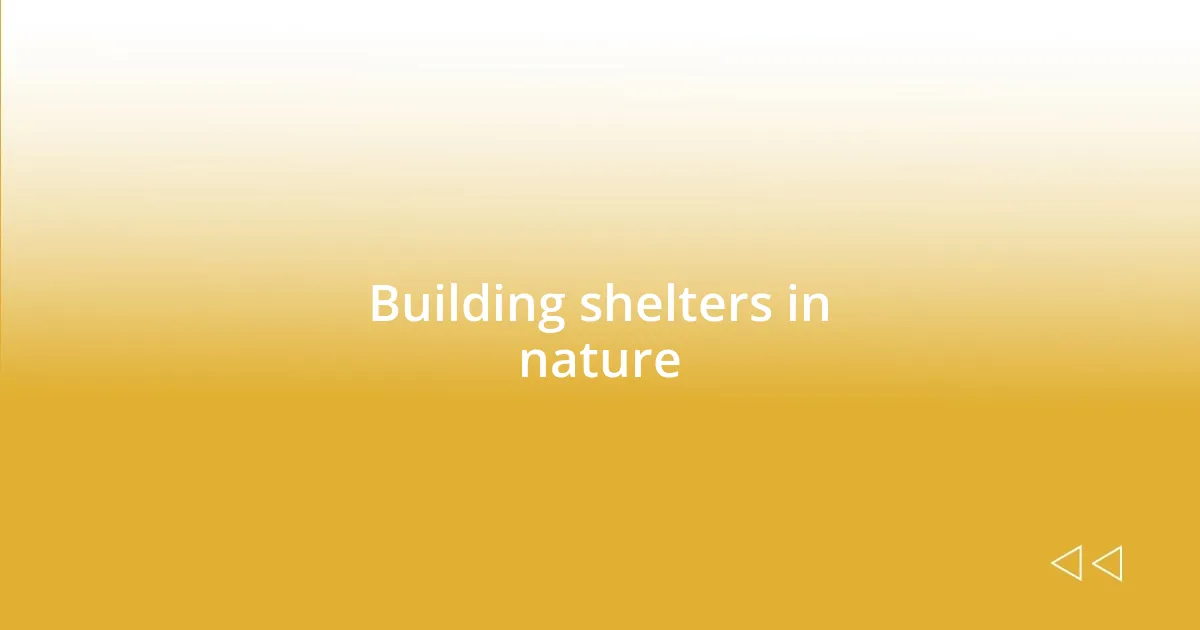
Building shelters in nature
Building a shelter in nature can be a truly transformative experience. I vividly recall a night when I was out in the wilderness, realizing I needed to protect myself from the chill. I found an overhang and began stacking stones and debris around me to form a windbreak. The satisfaction that arose from that simple yet effective structure was immense; it felt like I’d created a fortress of sorts, all from the very materials nature offered.
I’ve also experimented with different types of shelters, like the familiar lean-to. On one occasion, I spent an afternoon gathering large branches and leaning them against a sturdy tree. As I tucked in the foliage to provide insulation, I couldn’t help but feel a sense of connection to those who had done the same long before me. Can you imagine the stories behind those primitive structures? It’s incredible how such designs echo history, revealing our innate desire to shelter ourselves from the elements.
The real magic happens when you step back and appreciate the process. While building a shelter, I often find myself watching the sun dip below the horizon, feeling the earth shift around me. Each time, I leave with more than just a physical structure; I take with me lessons of patience and adaptability. Have you ever experienced that moment when everything seems to align, and you realize how interconnected we are with nature? It’s a powerful reminder that we’re part of a larger story.
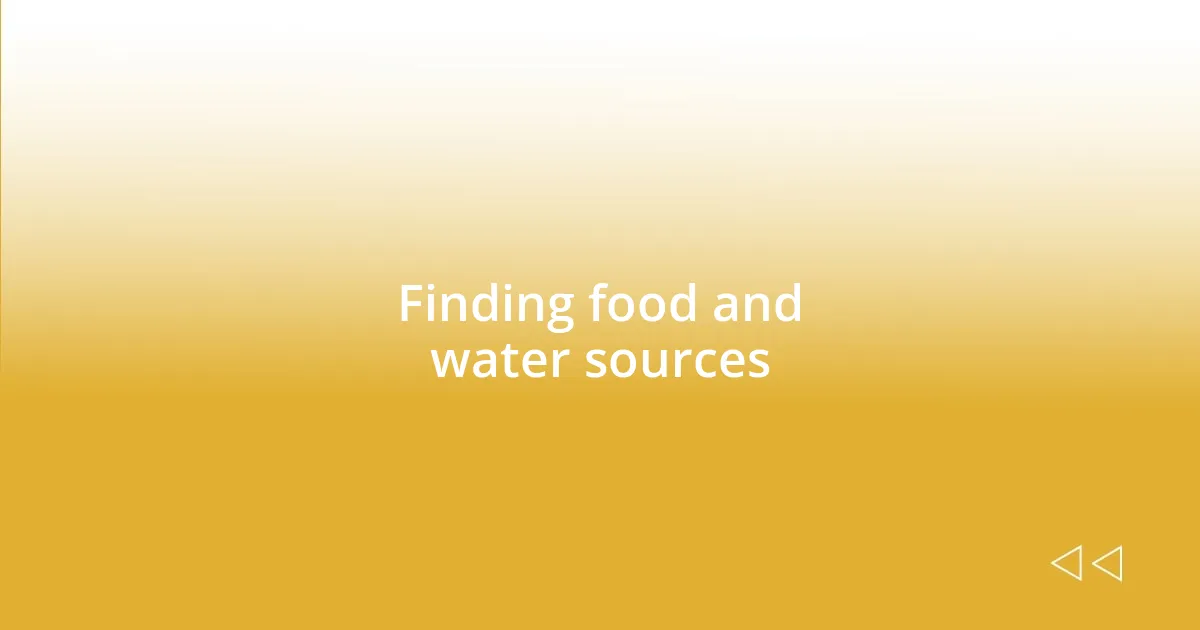
Finding food and water sources
Finding food and water in the wild is an essential survival skill that I’ve often pondered during my outdoor adventures. I once found myself stranded on a remote camping trip with dwindling food supplies. In that moment, I relied on my knowledge of edible plants, identifying wild berries and foraging for nuts. There’s something exhilarating about gathering your own food, isn’t there? That primal connection to nature sparks a sense of accomplishment that is hard to replicate in everyday life.
When it comes to water, I’ve learned that observing the landscape can lead to valuable sources. After a long hike, I spotted a trickle of water cascading down a rocky slope. The joy I felt at that moment—finding pure, fresh water—was incredible. It’s so often overlooked how vital it is to recognize where the land might naturally collect moisture. Whether it’s a stream or simply dew on leaves, those details can make a significant difference in survival situations.
I can’t stress enough the importance of purifying any water gathered from natural sources before drinking it. There was one time when I filled my canteen from a lovely little pond, only to realize later that I should have boiled it first. The stomach ache that followed was a harsh lesson. Have you ever faced a similar situation? It’s a reminder that while nature can provide, it always requires a bit of caution and respect. When we venture into the wild, we need to balance our excitement with knowledge and best practices for staying safe.










